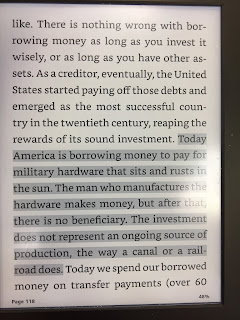In terms of audacity, Sweden is the world's greatest propaganda artist. News organizations praised the country last year because it avoided full lockdown in response to coronavirus. Prior to these laudatory stories, readers were treated to loads of pro-female, pro-equality Scandinavian slop, including ones where Sweden's foreign minister pledged to put feminism at the heart of its foreign affairs. (Maybe focusing on human rights issues would interfere with its arms exports?) Leading the transformation from "Old Milwaukee" beer's Swedish Bikini Team to the New Enlightenment is teenager Greta Thunburg, whose strategy against climate change appears to involve speaking sternly to adults in a voice so annoying, the non-deaf will be forced to agree to her demands, including, if necessary, hostages. (Whether her existence is an updated form of Stockholm Syndrome, now available as counter-strike, I do not know.)
If there is one country in the world that ought to be more careful, it is Sweden. Home to people who look suspiciously German, with a language openly borrowing from Germany, the Swedish media machine has somehow managed to erase its WWII ties to Nazi Germany.
As Espen Eidum's Blodsporet (aka The Blood Track) explains, Sweden's so-called "neutrality" during WWII meant it facilitated everyone's wartime efforts, including Nazi Germany's, profiting from both sides. As such, like "neutrality," the seemingly innocuous term "Scandinavian" improperly places Norway's attempted resistance, especially at the Battle of Narvik, on par with Finland's support of Nazi Germany and Sweden's lack of ethics. (Tellingly, Sweden was never directly attacked in WWII.)
Unfortunately, Sweden's moral compass continues to waver as we march into 2021, in no small part because of economic links with its former WWII "expertise." We mentioned Sweden's arms exports, but its private security businesses are no less accomplished. Securitas AB, one of the world's largest employers, is based in Stockholm. Securitas owns Protectas AG in Switzerland, another country claiming neutrality in WWII. (Protecting Nazi loot is big business, apparently.) When you combine weapons manufacturing and global private security, you start to realize if the dystopia featured in Logan (2017) ever approaches reality, all the non-X-Men characters will speak Swedish.
Think I'm exaggerating? The founder of Ikea, Ingvar Kamprad, once belonged to the Nazi movement. Even considering the strong possibility Kamprad was an infiltrator, the fact that Germany's Nazi movement seeped into 1943's rural Sweden speaks to the Swedes' feeble resistance. Infiltration, of course, works both ways, and Nazis and white supremacists sometimes hide out in police departments, military barracks, and intelligence agencies. In 1986, anti-war Prime Minister Olof Palme was assassinated, and his case has never been solved. Palme had once protested the Vietnam War (aka the American War of Aggression), and one gets the sense if the military-industrial complex could be personified, that person is sitting comfortably in a plush leather chair smoking an expensive cigar somewhere neutral.
Think I'm exaggerating? The founder of Ikea, Ingvar Kamprad, once belonged to the Nazi movement. Even considering the strong possibility Kamprad was an infiltrator, the fact that Germany's Nazi movement seeped into 1943's rural Sweden speaks to the Swedes' feeble resistance. Infiltration, of course, works both ways, and Nazis and white supremacists sometimes hide out in police departments, military barracks, and intelligence agencies. In 1986, anti-war Prime Minister Olof Palme was assassinated, and his case has never been solved. Palme had once protested the Vietnam War (aka the American War of Aggression), and one gets the sense if the military-industrial complex could be personified, that person is sitting comfortably in a plush leather chair smoking an expensive cigar somewhere neutral.
To its credit, Sweden knows it has problems. Stieg Larsson's The Man Who Played wiith Fire (2019) warned us of Sweden's neo-Nazi movements and intimidation against journalists. Subjected to the weight of history, both past and present, is it any wonder Sweden is desperate to make a teenager the face of its country?
In any case, Sweden's propaganda didn't fool Dr. Alfred Nobel, perhaps its most distinguished citizen. Stockholm may host a Nobel Prize Museum, but the museum's eponym intentionally designated Norway to administer the Nobel Peace Prize. I suppose in the end, there's a limit to how much sh*t a Swedish male will eat.
© Matthew Rafat (March 2021)
Bonus: confidential email from January 11, 2008.
Bonus: confidential email from January 11, 2008.






